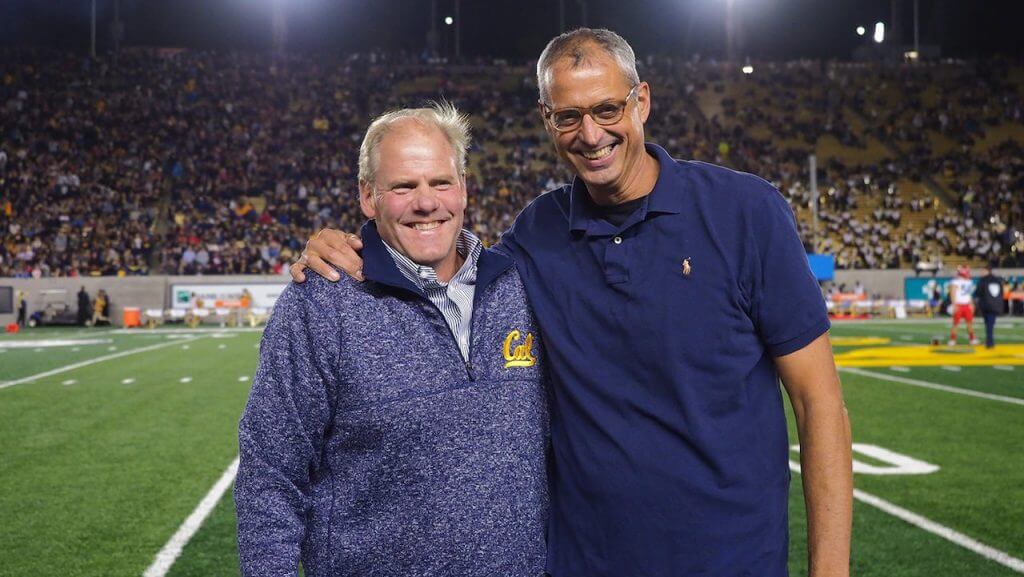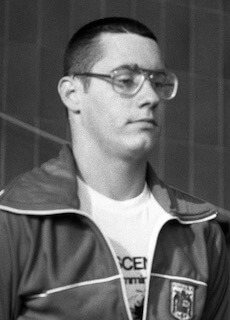Memories of Moscow 1980: When Sweden’s Pär Arvidsson Led A Podium Of Historic Firsts Over 100m Butterfly

Today marks the 40th anniversary of the fourth day of racing in the pool at the 1980 Olympic Games in Moscow, where Pär Arvidsson, Roger Pytell and David Lopez-Zubero made history by placing their respective countries on an Olympic podium for the first time in men’s butterfly
Swimming World continues its 40th anniversary coverage of the events of Moscow 1980 and their impact on those who missed out and what the Moscow Games meant for those who made it, even, in some cases, when their Governments did not endorse their participation but their nations did.

Moscow 1980
Our Moscow 1980 Olympics coverage so far
- Memories of Moscow 1980: 40 Years On, Mary T. Meagher Shares Memories of Olympic Boycott
- Memories of Moscow 1980: 40 Years To The Day Since Vladimir Salnikov Cracked 15-minute Barrier Over 1500m Free
- Memories Of Moscow 1980: How Duncan Goodhew Converted Olympic Gold To Victory In Life
- Memories of Moscow 1980: When Barbara Krause Took 100 Free Below 55sec 20 Years Before Her Day In Court With Kipke
- Memories of Moscow 1980 – When Sergei Fesenko Became The First Soviet Swimmer Among Men To Claim Olympic Gold
- Memories of Moscow 1980 – 40 Years Since Boycott Buried The Chances Of Cheryl Gibson & Maple Mates
- Moscow Olympic Flagbearers Max Metzker And Denise Boyd Linked Forever In Australia’s Proud Olympic History
- USOPC CEO Sarah Hirshland to 1980 Olympic Team: ‘You Deserved Better’
- The Moscow Boycott: A Toxic Mix of Sports and Politics Proved Costly for Hard-Working Athletes
How things might have panned out in the men’s 100m butterfly at the Moscow 1980 Olympic Games had boycott not thrown the deck in the air, we will never know. Some things we do know, including the result on this day 40 years ago at the 22nd Olympic Games held in the Soviet Union at a time when that country had invaded Afghanistan and the political fallout stretched to sport in a way that impacted the lives of many athletes not just that year but for lifetimes since.
On this day in 1980, Pär Arvidsson, of Sweden, Roger Pytell, of the German Democratic Republic, and David Lopez-Zubero, of Spain, became the first from their respective countries ever to make an Olympic butterfly podium. They rolled into the wall in 54.92, 54.94 and 55.13. A great race. A race, too, that was, in the context of Olympic swimming history, not where the pace would have been had the best in the world been there that day. The winning time was slower than the entire podium of Montreal 1976; slower than Mark Spitz when he claimed the fourth of his seven golds at Munich 1972; slower than the biggest guns that summer who were not there that day in Moscow.
On August 2, Americans William Paulus and Matt Gribble clocked 54.34 and 54.51 at U.S. Outdoor Nationals, where the times of the Moscow Games were posted on the scoreboard, to the chagrin of some of the athletes who felt, in the words of one multiple gold hope who missed her best shot at Olympic glory, “it was just ridiculous… we just weren’t where we ought to have been” (more on that later in our week of Moscow memories). None, however, got down to the April 1980 World-record speed of Arvidsson, 54.15.
The dynamics of ‘What If’ included a speedy moment on July 22, a day before the Olympic final: on tour in Canada, a teenager called Michael Gross clocked 54.69. By Los Angeles 1984, he would be known as Michael “The Albatross” Gross and was good for West German gold in a World record of 53.06 ahead of the man whose global standard he topped, American Pablo Morales, whose own Olympic roller-coaster and gold was yet to come. Gross would also claim Olympic gold in the 200m freestyle and butterfly in 1984 and 1988, his sparkling arrival in international waters in 1980 often overlooked but a part of the longevity of his career that might have seen him take medals at three Games.
Moscow was full of What Ifs but it remains forever full of What Was:
Moscow 1980 – Men 100m Butterfly – Athletes: 34; Nations: 29 – Gold for Pär Arvidsson
- 54.92 Pär Arvidsson SWE
- 54.94 Roger Pyttel GDR
- 55.13 David Lopez-Zubero ESP
55.25 Kees Vervoorn NED
55.35 Evgeni Seredin URS
55.42 Gary Abraham GBR
55.66 Xavier Savin FRA
55.70 Alexei Markovski URS
In April 1980, Pär Arvidsson had shaved 0.03sec off the world record that had stood to Joe Bottom (USA) at 54.18 since 1977. In Moscow this day 40 years ago, he retained his number one status by 0.02sec over Roger Pyttel, the first swimmer from his country to make an Olympic butterfly podium, eight years after backstroke superstar Roland Matthes had fallen just 0.13sec shy of the podium in the Munich 1972 final won by Spitz. In June 1976, Pytell confined Spitz’s 200m butterfly record to history with a first global mark in heats at GDR Olympic trials before becoming the first man inside 2 minutes with his second pioneering moment of the day, a 1:59.63.
Bronze in Moscow went to David Lopez-Zubero (ESP), who turned eighth at the 50m mark in 26.67, more than a second down on the leaders, before passing five rivals on the way home. David went down in history as the first Spanish swimmer ever to make an Olympic podium. Twelve years later, the US-based Spaniard’s brother, Martin Lopez-Zubero, would become Spain’s first Olympic swimming champion when he claimed 200m backstroke gold at Barcelona 1992.
If Pär Arvidsson was Sweden’s first Olympic butterfly champion (he remains one of three, with Lars Frölander, 100m, 2000; and Sarah Sjöstrom, the first Swedish woman to claim gold in the Olympic pool, 100m, 2016), he represented a crumb of comfort for absent Americans.
Like teammate and 100m backstroke champion in Moscow, Bengt Baron – later the President and CEO of Absolut Vodka – Arvidsson was from Finspång. Between 1976 and 1983, the ‘fly ace claimed 22 Swedish titles but he trained for a good part of his career in the United States, where he graduated from the University of California, Berkeley with a degree in economics. He swam for Cal Bears and after his racing days were done, he attended and graduated from Harvard Business School.
In 2017, Pär Arvidsson returned to his alma mater on a visit and was snapped with fellow Cal graduate and Olympic swim champion (though not over 100 ‘fly, Anthony Nesty having got to the wall 0.01sec sooner at Seoul 1988):
How about this pair of Golden Bear swim dads? Welcome back to Berkeley to two of the all-time best, Par Arvidsson and Matt Biondi! #GoBears pic.twitter.com/yPwePelVhi
— Cal Men's Swim & Dive (@calmenswim) October 22, 2017
Reign In Spain

David Lopez-Zubero Purcell – (DLZ Facebook)
For David Lopez-Zubero Purcell, with an American mother and a Spanish father, bronze came his way in a Spanish record and the honour of being his nation’s first Olympic swimming medallist. He was born in 1959 in Jacksonville and trained at the University of Florida but he opted to race for Spain, his father an ophthalmologist from Aragon who made a career in the United States.
López-Zubero the elder made the podium at his second Games: at 17 in Montreal 1976, he raced over 200 and 400m freestyle and the 4x200m relay. Eight years on, he would make a third Games, at Los Angeles 1984, a year after taking silver behind Gross over 100m butterfly at the European Championships in Rome.
There were Mediterranean Games titles along the way.
His own involvement with Olympic gold would come after his racing days were done: David became the coach of his brother Martín, who in 1991 crushed the World 200m backstroke record a year twice on the way to the 1992 Olympic crown at ‘home’ in Barcelona.
At the time, the López-Zubero Purcell were the fourth brothers in history to each claim Olympic medals.
Other finals this day 40 Years Ago At Moscow 1980
- 1:00.86wr Rica Reinisch GDR
- 1:02.07 Ina Kleber GDR
- 1:02.64 Petra Riedel GDR
1:03.81 Carmen Bunaciu ROM
1:03.82 Carine Verbauwen BEL
1:03.87 Larissa Gorchakova URS
1:04.47 Monique Bosga NED
1:05.10 Manuela Carosi ITA
At 15, Rica Reinisch became Olympic champion in the 100m and 200m backstroke, setting four world records along the way. The Dresden schoolgirl led one of six GDR podium sweeps in Moscow at a time when three swimmers per nation were allowed in each race. Reinisch equalled the 100m standard of retired Ulrike Richter (1:01.51) leading the GDR off to victory and a world record in the 4x100m medley (4:06.67). She then swam 1:01.50 in the heats and 1:00.86 in the final of the individual race. Over 200m, she shaved 0.16sec off absent American Linda Jezek’s world record for a 2:11.77 win. No other woman has ever broken four individual world records at one Olympic Games. More on Rica Reinisch soon.
Women 200m Breaststroke – Athletes: 25; Nations: 19
- 2:29.54or Lina Kachushite URS
- 2:29.61 Svetlana Varganova URS
- 2:32.39 Yulia Bogdanova URS
2:32.75 Susanne Nielsson DEN
2:33.23 Irena Fleissnerova TCH
2:34.34 Ute Geweniger GDR
2:34.51 Bettina Loebel GDR
2:35.38 Sylvia Rinka GDR
If the GDR took six sweeps in the women’s events at Moscow 1980, there was one podium wipeout that went elsewhere, to the hosts at a time when the Soviet program was flush with breaststroke talent. Four women from the USSR held the world record continuously between 1976 and 1985 and three of them shared the podium at the 1980 Games.
The battle of 1980 began in 1978: in April, Yulia Bogdanova broke the world record that had stood to 1976 Olympic champion Marina Koshevaia, by 0.03sec, in 2:33.32; in August, Lina Kachushite, aged 15, swam 2:33.11 in heats and 2:31.42 to claim the world title ahead of Bogdanova; on March 30, 1979, Svetlana Varganova clocked 2:31.09; seven days later, Kachushite settled the argument with a phenomenal 2:28.36, which survived as the global standard for six years and two months.
In the meantime, Varganova set the pace in the third heat at the Games in Moscow with a 2:29.77 Olympic record, and led the way in the final, at 34.47 and a halfway 1:12.43. At that point Ute Geweniger (GDR) was second, on 1:12.77, and Susanne Nielsson (DEN) third in 1:13.94, with Kachushite, of Lithuania, third in 1:14.02. Varganova, at 1:50.62, was way ahead at the last turn but Kachushite, second at 1:53.13, looked to be biding her time. And so she was.
Stroke by stroke, the world record holder clawed back the deficit, drew up to Varganova’s shoulder with five metres to go and timed her finish to perfection; Kachushite claimed gold on the last stroke in an Olympic record of 2:29.54, to 2:29.61 for her teammate, with Bogdanova having sped through the field on the way home to take bronze 0.36sec ahead of the Dane. Kachushite’s victory remains the smallest in the history of the event since it was introduced at Paris 1924.
Two years on, Varganova claimed the world title, at Guayaquil 1982, in 2:28.82, Geweniger much improved, for silver in 2:29.71, Canada’s Anne Ottenbrite third in 2:33.05. Ottenbrite would claim the Olympic crown four years later in Los Angeles, on 2:30.38, at the helm of a final complete by American Kim Rhodenbaugh, who, it would turn out, had reason to not be at the best she could be, her story told in this compelling book and story of abuse.
In Moscow, three days after the 200m final, Kachushite finished seventh in the 100m won by Geweniger, with Nielsson third behind a different Soviet swimmer, Elvira Vasilkova.




Great and sad memories. Thank you, Craig.